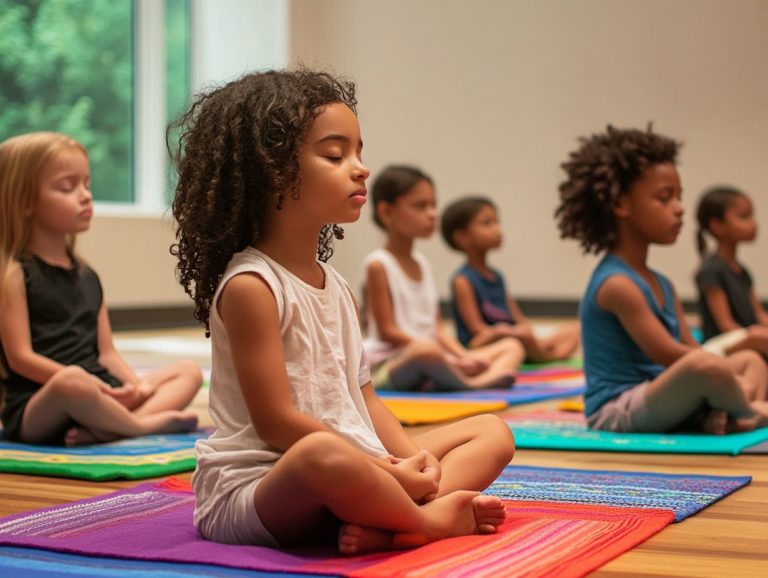Engaging Kids in Mindful Conversations
Contents
- The Importance of Mindful Conversation with Children
- Key Takeaways:
- What is Mindful Conversation?
- Why is Mindful Conversation Important for Kids?
- 1. Improves Communication Skills
- 2. Encourages Empathy
- 3. Builds Emotional Intelligence
- How to Engage Kids in Mindful Conversations?
- What are Some Mindful Conversation Topics for Kids?
- How to Make Mindful Conversation a Daily Practice for Kids?
- Incorporate Mindfulness into Daily Activities
- Encourage Mindful Communication with Others
- Frequently Asked Questions
- What are some ways to engage kids in mindful conversations?
- Why is it important to have mindful conversations with kids?
- How can I encourage my child to participate in mindful conversations?
- What are some age-appropriate topics for mindful conversations with kids?
- How can I incorporate mindful conversations into daily routines with my child?
- What are some potential benefits of engaging kids in mindful conversations?
The Importance of Mindful Conversation with Children
In a world that often feels overwhelmingly fast-paced and noisy, embracing mindful conversation and mindfulness practices offers a refreshing way to connect with children on a deeper level.
It s not just about exchanging words; it s about nurturing understanding, empathy, emotional intelligence, and self-compassion. This article explores mindful conversation’s essence and its vital role in children’s growth.
You will find practical tips for engaging children in meaningful dialogue, thoughtful topics to explore together, and strategies to integrate these enriching conversations into your daily routine, including mindfulness activities and exercises.
Get ready to unlock the incredible power of mindful communication, mindfulness exercises, and meditation to transform your interactions with the young ones in your life!
Key Takeaways:
- Engage kids in mindful conversations to improve their communication skills, encourage empathy, build emotional intelligence, and foster positive relationships.
- Practice active listening, use open-ended questions, encourage reflection and self-awareness, and model mindful conversation to engage kids effectively.
- Explore mindful conversation topics like emotions and feelings, gratitude and kindness, mindful eating, and nature and the environment.
- Make mindful conversation a daily practice by setting aside dedicated time, incorporating mindfulness into daily activities, and encouraging mindful communication with others. Introduce mindfulness games and family mindfulness sessions for additional benefits.
What is Mindful Conversation?
Mindful conversation represents an intentional and present approach to communication, inviting you and your family to explore deeper emotional awareness and connection. This practice can be enhanced by incorporating mindfulness training and guided meditation sessions.
By using mindfulness techniques like active listening and thoughtful responses, you nurture the invaluable parent-child bond, laying the groundwork for improved communication skills and emotional intelligence. This practice encourages you to stay in the present moment, fostering emotional regulation and resilience through open dialogue.
As you engage in these meaningful conversations, you cultivate kindness, empathy, and self-compassion the cornerstones of effective communication and relationship-building within your family.
Why is Mindful Conversation Important for Kids?
Mindful conversation is crucial for children as it develops essential skills like emotional intelligence, resilience, effective communication, and stress management. When you engage them in dialogues that prioritize mindfulness, they learn to express their thoughts and feelings clearly, which significantly enhances their ability to handle social situations.
This practice enables them to listen actively and respond with empathy, fostering positive relationships with peers and family members. It also supports the development of executive functions mental skills needed for planning, focus, and self-control and coping strategies.
Mindful conversations provide children with valuable coping strategies for managing stress, allowing them to regulate their emotions more effectively and approach life’s challenges with a composed mindset.
1. Improves Communication Skills
Engaging in mindful conversation elevates your child’s communication skills by encouraging them to express their thoughts and emotions with openness. It also hones their active listening abilities. Through mindfulness exercises, children grasp the significance of being present in conversations, which enables them to connect more meaningfully with others.
This practice enhances their vocabulary and language proficiency while also fostering emotional regulation, enabling them to articulate their feelings with clarity and respect. Mindful breathing and mindfulness jar activities can be particularly helpful in this regard.
For example, incorporating mindfulness tools like deep breathing exercises or guided reflections can cultivate an environment that feels safe for your kids to share their perspectives. Practicing these in family mindfulness sessions can further enhance the experience. Families can embrace these techniques together, establishing a regular practice that nurtures emotional awareness and strengthens familial bonds.
During family discussions, you might prompt your children to pause and reflect on their feelings before responding. This paves the way for more thoughtful and constructive exchanges.
Such techniques not only refine the way your children engage in conversation but also instill invaluable life skills and skills for managing tasks and making decisions that they will carry with them into adulthood.
2. Encourages Empathy
Engaging in mindful conversations encourages empathy in children by fostering a deeper understanding of their own emotions and those of others. When you introduce methods that help focus and calm the mind like kindness meditation and reflective listening, you help them develop emotional awareness, allowing them to step into someone else’s shoes. This emotional intelligence is vital for building strong social skills and nurturing compassionate relationships.
Integrating techniques such as guided imagery and kindness meditation can further enhance their ability to visualize the feelings of others, promoting a more profound sense of connection.
Practicing emotional awareness exercises like identifying and discussing feelings in various scenarios enables children to articulate their thoughts while exploring diverse perspectives. These exercises create a supportive environment where they feel safe to express their emotions and uncertainties.
Incorporating gratitude practices can further enrich these discussions. By cultivating empathy now, you prepare your child for a kinder future.
3. Builds Emotional Intelligence
Mindful conversation is a powerful tool for nurturing emotional intelligence in children, equipping them with the necessary skills to understand and manage their emotions effectively. It also improves focus and helps manage attention problems.
By engaging in mindfulness and reflective discussions, you help them recognize their feelings and cultivate self-compassion. This emotional awareness not only enhances their interactions with others but also provides them with valuable coping strategies for navigating stress and challenges.
As they practice sharing their thoughts and feelings in a safe and supportive environment, they become adept at navigating social dynamics with greater empathy and understanding. This contributes to better academic performance and overall mental health.
This method encourages active listening, allowing them to appreciate various perspectives and respond to others with kindness.
Incorporating emotional skills into conversations nurtures resilience, enabling children to face setbacks with a more positive outlook. Through these mindful dialogues, they not only refine their self-regulation abilities but also cultivate stronger relationships, ultimately supporting their overall emotional development and well-being.
Start these mindful conversations today for a brighter tomorrow!
4. Fosters Positive Relationships
Fostering positive relationships is one of the key benefits of engaging in mindful conversations, as it encourages you to connect meaningfully with your peers and family members. This can be particularly beneficial in mindful parenting practices.
Mindfulness practices create an atmosphere of trust and openness, making it easier for you to communicate your feelings and listen to others. This nurturing environment not only strengthens your social skills but also promotes resilience and emotional well-being.
When you practice being present in your conversations, you discover the value of empathy and active listening, which are essential skills for building lasting connections. Parents and caregivers play a crucial role in modeling these behaviors, showing you how to engage thoughtfully and respectfully. Such interactions can significantly influence how you navigate your social world, whether it s resolving conflicts or building friendships.
Incorporating mindfulness techniques, like deep breathing or reflective pauses, can enhance the quality of discussions, allowing for deeper understanding and greater emotional intelligence. Ultimately, fostering a culture of mindful dialogue can lead to more harmonious family dynamics and enriching peer relationships.
How to Engage Kids in Mindful Conversations?
Engaging children in mindful conversations requires a thoughtful approach, utilizing strategies that cultivate a supportive environment for open expression. These include mindfulness training and mindfulness sessions specifically tailored for kids.
You can implement techniques such as active listening, posing open-ended questions, and encouraging moments of reflection, all of which are essential for fostering meaningful dialogue.
Furthermore, integrating mindfulness tools like guided practices and mindfulness exercises can significantly enhance their ability to stay focused and present during discussions, ultimately nurturing their emotional awareness, attention skills, and communication skills.
1. Practice Active Listening
Practicing active listening is crucial for engaging in mindful conversations with kids, as it makes them feel genuinely heard and valued. By fully concentrating on what the child is saying and responding thoughtfully, you model effective communication skills and enhance their emotional awareness. This approach fosters a sense of security and trust, which is vital for maintaining open dialogue.
Active listening not only deepens understanding between you and your child but also strengthens the emotional bond you share, enhancing both of your emotional intelligence.
You can implement this technique by maintaining eye contact and minimizing distractions, demonstrating genuine interest in what they have to say. Paraphrasing their thoughts shows that you take their feelings seriously.
Encouraging your child to express themselves without interruptions allows them the freedom to share, which boosts their confidence and self-esteem. Incorporating open-ended questions invites deeper discussions, enabling you to explore their feelings and perspectives further, ultimately elevating the overall quality of your communication and enhancing their emotional awareness.
2. Use Open-ended Questions
Utilizing open-ended questions is an incredibly effective method for fostering mindful conversations with children, as it encourages them to think critically and express their thoughts in depth. By steering clear of yes or no queries, you can promote reflection and emotional awareness, allowing your child to explore their feelings and perspectives more fully.
This practice not only enhances their communication skills but also nurtures a deeper connection between you and your child.
For example, instead of asking, “Did you have a good day at school?” consider saying, “What was the most interesting part of your day?” This slight shift invites your child to recount specific experiences and emotions, giving them a voice in the dialogue. Techniques like active listening, where you paraphrase or summarize what your child shares, further reinforce this open exchange.
Implementing regular check-ins with open-ended questions helps create a safe space, cultivating an environment built on trust where your child feels valued and understood. Engaging in this mindful approach not only enhances your mutual understanding but also enables your child to articulate their emotions more effectively. Including meditation and breathing exercises can further support emotional regulation and coping strategies, providing additional tools for your child’s emotional growth.
3. Encourage Reflection and Self-awareness
Encouraging reflection and self-awareness during mindful conversations can significantly enhance your child’s emotional intelligence. By prompting them to think about their feelings and reactions, you help them develop a deeper understanding of themselves.
This practice not only enables children to articulate their experiences more clearly but also fosters managing emotions and resilience.
Engaging your child in discussions about their thoughts can serve as a powerful tool for promoting empathy, self-compassion, and social skills. Utilizing strategies such as open-ended questions, journaling, storytelling, or mindfulness activities can be incredibly effective in prompting deeper insights.
For instance, when you ask your child to describe how they felt during a particular event, it invites them to explore their emotional landscape. This validation of their experiences lays the groundwork for healthier interpersonal relationships and resilience.
By consistently weaving these mindful conversations into your daily interactions, you can cultivate an environment where your child feels safe to express themselves and learn essential life skills and attention skills. These skills are vital for academic performance and overall mental health.
4. Model Mindful Conversation
Modeling mindful conversation offers an incredible opportunity for you as a parent to illustrate the significance of mindfulness in communication to your children. By practicing active listening, demonstrating emotional awareness, and responding thoughtfully, you set a positive example for them to emulate.
This approach deepens the parent-child bond and reinforces the importance of mindfulness in nurturing healthy communication and stress management.
For instance, when you discuss daily events, encourage your children to openly share their feelings and thoughts. Make it clear that every perspective holds value. Techniques like using ‘I’ statements can help you express emotions without casting blame, fostering empathy in the process.
Dedicating specific times for family discussions, free from distractions, allows for deeper connections and enhances the practice of being truly present. This reinforces mindful parenting as a family practice.
By prioritizing these mindful interactions, you can instill foundational communication skills in your children that promote emotional intelligence and conflict resolution. This equips them for thoughtful interactions in their future and helps in stress reduction, improving their attention focus.
What are Some Mindful Conversation Topics for Kids?
Selecting the right topics for meaningful conversations with children can greatly enhance their engagement and emotional growth. Consider focusing on themes that delve into emotions and feelings, gratitude and kindness, as well as mindful eating and nature.
These subjects serve as excellent starting points for nurturing open dialogue and positive moments in your daily interactions.
By embracing these discussions, you can guide your children in exploring their emotions, cultivating gratitude, and fostering a deeper understanding of the world around them.
1. Emotions and Feelings
Discussing emotions and feelings is essential for engaging in mindful conversations with children. It encourages them to talk about what they feel and cultivate emotional awareness.
By exploring various emotions, you can help kids recognize their feelings and understand the significance of emotional regulation. This practice fosters resilience and enhances their emotional intelligence. It equips them with the necessary tools, such as coping strategies, to navigate life’s challenges.
You might start these conversations by asking thoughtful questions like, “Can you tell me about a time when you felt really happy?” or using prompts such as, “What do you think anger feels like in your body?” Such inquiries give children the chance to express their emotions and create a safe space for discussing their feelings openly.
Engaging in discussions about emotions helps children build stronger connections with adults and peers. It nurtures an environment where empathy and understanding can flourish. Incorporating mindfulness games and mindfulness exercises can further enhance these conversations.
For instance, encouraging kids to draw or write about their feelings can promote their ability to express what they are experiencing. This leads to greater emotional clarity and personal growth. Activities such as creating a mindfulness jar or practicing kindness meditation can also contribute to their emotional development.
2. Gratitude and Kindness
Exploring gratitude and kindness during mindful conversations greatly enhances your child’s emotional intelligence and perspective on relationships. By discussing what they are thankful for and how they can show kindness to others, your kids will learn to develop a positive mindset and foster empathy.
This practice promotes emotional awareness and self-compassion, creating a nurturing environment for their personal growth. Try adding a regular gratitude practice to reinforce these values.
Incorporating activities like gratitude journals or kindness challenges can engage your children in meaningful ways. For example, encouraging them to share three things they appreciate each day helps them recognize the good in their lives. This practice can support stress reduction and improve their overall well-being.
Consider organizing a weekly kindness challenge where your children perform small acts of kindness for family members, friends, or even strangers. This powerfully reinforces the idea that empathy and understanding are essential components of healthy interactions.
By modeling these behaviors and creating opportunities for reflective discussion, you can effectively nurture your child’s social skills and emotional awareness. This leads to improved relationships and a deeper sense of fulfillment.
3. Mindful Eating
Mindful eating is an engaging topic to explore with kids. It encourages them to connect with their food and cultivate healthy eating habits.
By discussing the significance of being present during meals, children can learn to appreciate the rich flavors and diverse textures of their food. This practice promotes emotional awareness around food choices, enhances body awareness, and nurtures a positive relationship with eating.
To make this practice even more enjoyable, consider incorporating fun activities like food journaling or creating a vibrant rainbow plate. Teaching children to recognize their hunger cues helps them differentiate between genuine hunger and eating out of boredom.
Involving them in grocery shopping, where they can select fresh fruits and vegetables, sparks curiosity and enables healthier choices. These activities can also integrate mindfulness skills and improve their sensory awareness.
These simple yet effective techniques foster a mindful eating habit and encourage meaningful conversations about nutrition. This helps young ones develop lifelong healthy habits.
4. Nature and the Environment
Engaging in discussions about nature and the environment offers a treasure trove of opportunities for meaningful conversations with children, nurturing their sense of wonder and awareness of the world that surrounds them. By inviting kids to explore their feelings about nature and its significance, they can forge a deeper emotional connection to their surroundings. This practice not only enhances their emotional intelligence but also encourages them to truly appreciate the beauty of the environment and understand the importance of mindfulness practice.
These discussions can take on various forms, from casual observations during a nature walk to more structured conversations at home. For example, you might ask your child about their favorite animal and the reasons behind their choice, thereby opening the door to a dialogue about different species and their habitats. By encouraging them to notice changes in the seasons or the sounds of wildlife they encounter, you can spark their curiosity and instill a sense of responsibility for conservation. Activities like a mindfulness walk can further enhance their engagement with nature.
Prompt them to reflect on how plants and animals contribute to the ecosystem while also emphasizing the impact of human actions. This thoughtful engagement not only fosters a love for nature but also enables children to think critically about their interactions with the planet. Discussing topics like sustainability and environmental conservation can further enhance their understanding and commitment.
How to Make Mindful Conversation a Daily Practice for Kids?
Making mindful conversation a daily practice for kids can be enriched by incorporating various guidance techniques. Engage in regular mindfulness sessions with your children, focusing on different mindfulness activities to keep it engaging and fun. Including breathing techniques and guided practices can help children stay grounded and improve their attention focus. This consistent practice will foster a deeper parent-child connection and support children’s mental health and overall well-being.
Incorporating mindful conversation into daily routines is crucial for nurturing your child’s emotional awareness and refining their communication skills. By intentionally setting aside time for meaningful discussions, you create a consistent practice that cultivates mindfulness in your child’s life.
Moreover, weaving mindfulness tools and exercises into everyday activities can deepen engagement and inspire your children to express themselves with confidence and openness.
1. Set Aside Dedicated Time for Mindful Conversation
Setting aside dedicated time for mindful conversation is essential for cultivating a nurturing environment where children feel at ease expressing their thoughts and emotions. By making this time a priority, you can establish a routine that underscores the importance of communication and emotional awareness. This intentional practice doesn t just strengthen the bond between you and your child; it also reinforces the significance of mindfulness in your daily interactions.
Establishing a routine for these conversations can be as straightforward as carving out a few minutes each day perhaps during meals or right before bedtime. You can encourage open dialogue by actively listening without judgment and responding with empathy to your child s feelings and experiences.
Incorporating practices like sharing gratitude or discussing the highlights of the day can make these moments even more engaging. To deepen these exchanges, you might also consider integrating mindfulness techniques, such as deep breathing, to foster a calm atmosphere that encourages honest discussions.
Ultimately, dedicating time to these nurturing conversations is vital in developing your child s emotional intelligence and self-expression.
Incorporate Mindfulness into Daily Activities
Incorporating mindfulness into your daily activities can greatly elevate the quality of your conversations with your children. By seamlessly weaving mindfulness exercises like mindful breathing and gratitude practices into your everyday routines, you can create valuable opportunities for open dialogue and emotional regulation. These practices not only emphasize the significance of being present but also help your kids express their feelings in a nurturing environment.
Consider dedicating just a few minutes each day to a mindful breathing session. You might guide your children to close their eyes and focus on their breath, counting each inhale and exhale. This simple yet profound practice calms the mind and helps you bond better with your child.
Transforming ordinary routines like mealtime or car rides into moments of gratitude can be rewarding. By taking turns to share something you are thankful for, your family can cultivate an appreciative mindset. This enhances emotional resilience and encourages genuine conversations that strengthen your bond.
Encourage Mindful Communication with Others
Encouraging mindful communication with others is crucial for helping your child develop social skills and emotional awareness beyond the confines of home. By teaching your children the principles of mindfulness in their interactions with peers, you create a nurturing environment that fosters empathy and understanding. This practice strengthens their relationships and equips them with valuable coping strategies for navigating everyday social challenges.
In various social settings, you can employ a range of strategies to enhance this practice. For example, consider organizing role-playing activities, where your child engages in conversations that require active listening and thoughtful responses, mimicking real-life scenarios they may face at school or during playground interactions.
Another effective approach is to allocate time for guided discussions, encouraging your children to express their feelings while remaining attentive to the emotions of others. You might also introduce games that emphasize turn-taking and non-verbal cues, helping them appreciate the importance of body language in effective communication.
By weaving these activities into their routine, mindfulness will effortlessly become a natural part of their interactions, paving the way for collaborative problem-solving and deeper connections with their peers.
Frequently Asked Questions
What are some ways to engage kids in mindful conversations?
Some ways to engage kids in mindful conversations include asking open-ended questions, listening actively, and encouraging reflection and empathy.
Why is it important to have mindful conversations with kids?
Mindful conversations can help kids develop important social and emotional skills, improve communication, enhance self-awareness, and build positive relationships.
How can I encourage my child to participate in mindful conversations?
You can encourage your child to participate in mindful conversations by creating a safe and non-judgmental environment, modeling good listening and communication skills, and using age-appropriate activities and prompts.
What are some age-appropriate topics for mindful conversations with kids?
Age-appropriate topics for mindful conversations with kids could include emotions, coping skills, gratitude, mindfulness, and empathy.
How can I incorporate mindful conversations into daily routines with my child?
You can incorporate mindful conversations into daily routines by setting aside dedicated time for conversation, making it part of daily activities like mealtime or bedtime, and using specific prompts to spark discussion.
What are some potential benefits of engaging kids in mindful conversations?
Potential benefits of engaging kids in mindful conversations include improved communication and social skills, increased self-awareness and self-regulation, and stronger parent-child relationships.




